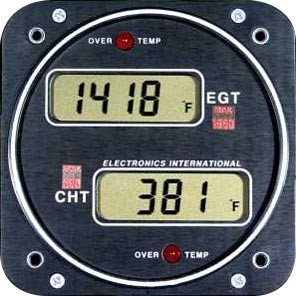Detonation
Detonation causes the fuel-air charge in the cylinder to release heat all at once, rather than slowly, over time. You will see a rising CHT reading (1 to 2 degrees F per second) and a decreasing EGT reading. Exhaust gases are cooler after detonation occurs because the fuel-air charge has already released much of its heat to the piston and cylinder.
Detonation can be caused by a lower grade fuel than recommended, a time expired fuel, an over-lean mixture, operating with high manifold pressures in conjunction with low RPMs, an over-heated engine (can occur during extended ground operations or steep climbs), or excessive temperature of the air passing through the carburetor. To avoid detonation use an enriched mixture during takeoff and climb and maintain a shallower climb angle. Avoid extended, high- power steep climbs.If detonation is expected richen the mixture, throttle back, or increase airspeed to reduce cylinder head temperatures.

